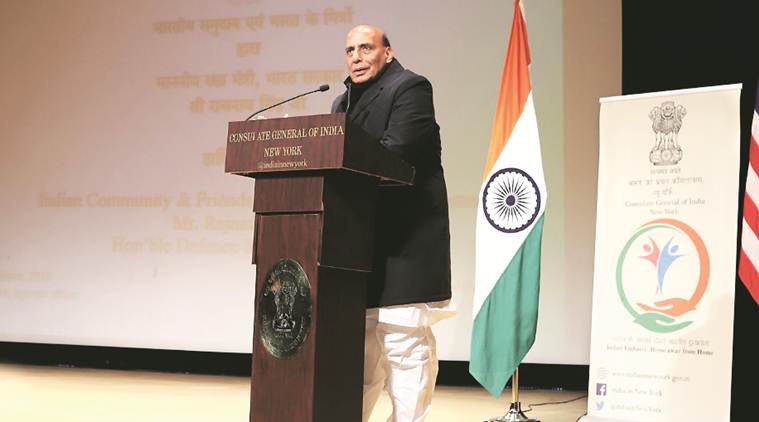Four days after it urged India to “protect the rights of its religious minorities” in keeping with its “Constitution and democratic values”, the US on Tuesday asked Indian authorities to “protect and respect the right of peaceful assembly.”
“We are closely following developments regarding the Citizenship Amendment Act. We urge authorities to protect and respect the right of peaceful assembly. We also urge protestors to refrain from violence,” a US State Department spokesperson said in a statement in Washington DC.

The statement comes after the spate of protests across the country, especially by students, against the new citizenship law.
Story continues below this ad
It also sets the stage and tone for the 2+2 ministerial dialogue between two sides on Wednesday in Washington DC — External Affairs Minister S Jaishankar and Defence Minister Rajnath Singh with their American counterparts, Secretary of State Mike Pompeo and Defence Secretary Mark T Esper.
While the agenda of the meeting is to discuss bilateral strategic issues, a discussion between the two sides on issues like new citizenship law and Kashmir cannot be ruled out.
Explained: What is USCIRF, the US body that feels Amit Shah should face sanctions for CAB?
Earlier on December 13, while stressing that “respect for religious freedom and equal treatment under the law are fundamental principles of our two democracies”, the US State Department had said, “The United States urges India to protect the rights of its religious minorities in keeping with India’s Constitution and democratic values.”
Story continues below this ad
Also Read | UN human rights official says Citizenship law is fundamentally discriminatory
With two statements in a span of four days, Washington is indicating a strong signal – especially days after the US House Foreign Affairs Committee had voiced concerns over the Citizenship (Amendment) Bill, noting that any religious test for citizenship undermines pluralism, which is one of the core shared values for both India and the United States.
The US government’s statement does not yet condemn the move, but has gently nudged New Delhi to act as per the Constitution of India and “democratic values”. However, the UN Human Rights chief is much more expansive.
Last week, US House Foreign Affairs Committee had tweeted, “Religious pluralism is central to the foundations of both India and the United States and is one of our core shared values.”
Story continues below this ad
Read | US Commission has no locus standi: India on Citizenship Bill remarks
“Any religious test for citizenship undermines this most basic democratic tenet,” it had said.
Meanwhile, US Congressman André Carson – one of three Muslim members currently serving in the US Congress – slammed the legislation and said that the move is yet another attempt to “effectively reduce Muslims in India to second-class citizens”.
India, which has come under increased scrutiny in the US Congress since Article 370 was abrogated and Jammu and Kashmir’s special status was withdrawn, has responded to the statement by an advisory body on international religious freedom to the US Congress,
Story continues below this ad
US Commission on International Religious Freedom (USCIRF), which took a harder line on the new citizenship law, as it called for sanctions against Home Minister Amit Shah and other leaders, if the Bill is passed in both Houses of the Parliament.
The Ministry of External Affairs had responded to the USCIRF statement, and said that it is “neither accurate nor warranted”, and added that it is “regrettable” that the body has chosen to be guided only by its “prejudices and biases” on a matter on which it clearly has “little knowledge and no locus standi”.
Also Read | India’s new citizenship law may have its implications: US diplomat
On the US House Foreign affairs committee’s statement, the MEA spokesperson has said that they have reached out to the members of the US Congress and other stakeholders to share it’s perspective on the Bill.
Story continues below this ad
“We feel that given our strong engagement with the Congress and other stakeholders in the US on matters of mutual interest, we expect that the members of the US Congress will take into account our views before drawing a conclusion on the Bill,” he added.

 Defence Minister Rajnath Singh at an event organised by the Consulate General of India in New York. (Source: Twitter)
Defence Minister Rajnath Singh at an event organised by the Consulate General of India in New York. (Source: Twitter)






